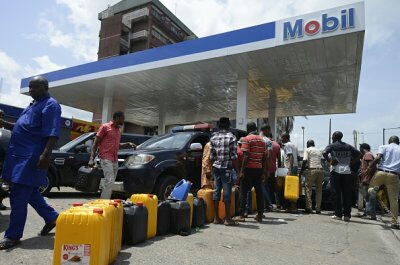Nigeria fuel battle: Strike expected as talks over petrol price rises reach stalemate
Nigerian labour union and civil society groups announced they are to go ahead with their planned strike on Wednesday (18 May 2016) after talks with the federal government on increased petrol prices reached a stalemate. Earlier in May, Nigeria scrapped petrol subsidies by increasing prices by two-thirds in a bid to curb an ongoing fuel shortage, exacerbated by a foreign exchange crisis.
A litre of petrol now costs 145 naira (50p), up from about 86.5 naira (30p). However, the move has angered many, with trade and labour unions labelling the decision "criminal" and calling for the strike.
Niger Delta Avengers: militant group 'might result in new conflict' in oil-rich Nigeria
Decapitated body of Jubal Dee Alexander found inside truck in Texas
Iraq: 13 killed and 40 wounded in Islamic State attack on Shia market in Baghdad
Talks between the unions and the federal government started on 16 May and are expected to continue. However, Abiodun Aremu, secretary general of the labour and civil society coalition, said the government must backtrack on the price hike before an agreement can be reached.
"There is no way that any discussion now with the government will affect the strike except there is a reversal, because the government did not consult with us before it unilaterally impose the act," he said, according to Voice of America.
He added that the coalition would announce its plan of action for the strike on Tuesday (17 May).
The government justified its decision to increase petrol prices as a way to end fuel scarcity. "Many have been asking why this would happen at this time and what triggered the decision concerning the new framework for petrol products supply, distribution and pricing," Alhaji Lai Mohammed, minister of information and culture, told reporters in the capital Abuja.
"Gentlemen, we have no choice than to liberalise the price of petrol, if we are to end the crippling fuel scarcity that has enveloped the country, ensure the availability of the products and end the suffering of our people over the lingering scarcity," he continued.
Peter Walker, a UK-based senior consultant, told IBTimes UK that removing oil subsidy in Nigeria was a crucial first step towards tackling corruption and stabilising fuel prices.
Nigeria's oil subsidy explained
Nigeria is Africa's biggest oil producer, but its lack of refineries mean that the country has to export about 90% of its crude oil and import back petroleum products at international prices. The government then sells fuel to Nigerians at subsidised rates and reimburses the difference to importers.
Nigeria announced in May that petrol prices would rise to 145 naira, up from about 86.5 naira. The prolonged fuel scarcity in the country meant that Nigerians were already paying prices considerably higher – up to 250 naira – than the the price established after the subsidy was scrapped.
President Muhammadu Buhari, who took office in May 2015, has often been urged to end oil subsidy and privatise the country's oil refineries, so that the state would not spend money on yearly maintenance programmes. In July 2015, three out of the four refineries in Nigeria resumed production after undergoing a restructuring programme.
In 2012, the previous administration led by Goodluck Jonathan, attempted to end subsidies by doubling the price of a litre of petrol overnight, angering citizens who argued that low prices were the only benefits they enjoyed from the oil-rich nation. The government subsequently made U-turn on its decision following violent protests.

No comments:
Post a Comment